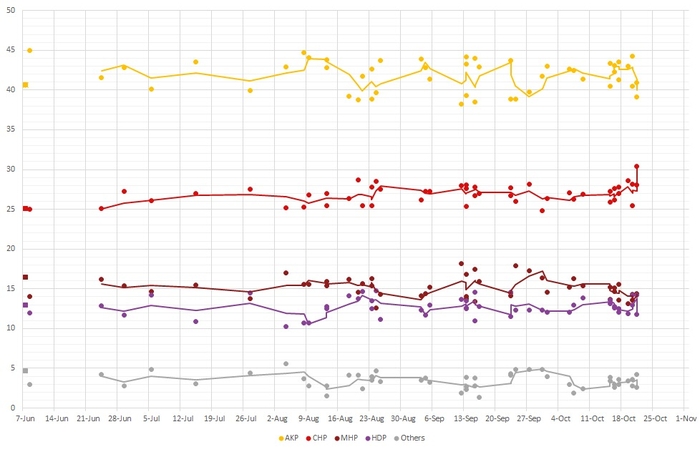[N.B.: NRO titled this analysis "Turkey's Election Results Stink of Fraud"]
Like other observers of Turkish politics, I was stunned on Nov. 1 when the ruling Justice and Development Party (Adalet ve Kalkınma Partisi, or AKP) was reported to have increased its share of the national vote since the last round of elections in June 2015 by 9 percent and its share of parliamentary seats by 11 percent.
The polls had consistently shown the four major parties winning about the same number of seats as in June. This made intuitive sense; they represent mutually hostile outlooks (Islamist, leftist, Kurdish, nationalist), making substantial movement between them in under five months highly unlikely. That about one in nine voters switched parties defies reason.
 Polling results between the June and November 2015 Turkish elections. |
The AKP's huge increase gave it back the parliamentary majority it had lost in the June 2015 elections, promising President Recep Tayyip Erdoğan a semi-legal path to the dictatorial powers he aspires to.
But, to me, the results stink of fraud. It defies reason, for example, that the AKP's war on Kurds would prompt about a quarter of Turkey's Kurds to abandon the pro-Kurdish party and switch their vote to the AKP. As news of irregularities comes in, Michael Rubin of AEI summed up the problems at Commentary:
Turkish political analysts attribute Erdoğan's cheating quotient at around 5 percent – that takes into account stuffed ballots, shenanigans on the state-run Turkish Airlines as it transports ballots from abroad, disappeared ballot boxes from opposition-run towns and districts, and pretty much everything involving the mayor of Ankara. In the case of Sunday's elections, it appears that Erdoğan's AKP won the votes of hundreds of thousands of dead people..
Given the history of fraud in Turkey's elections, that this one was rigged should come as no shock, especially as rumors swirled in advance about sophisticated efforts to manipulate the results. (For methods, think the Volkswagen emissions scam.)
The citizens of Turkey now face the decisive question of whether to accept or reject the results of this election. Which will prevail – fear of Erdoğan's ruthlessness or anger at his swindle? Sadly, because his electoral coup d'état has blocked the path of democracy, should Turks resist, they are compelled to do so in non-democratic ways. (November 3, 2015)
Nov. 6, 2015 update: Emre Deliveli asks in the Independent, "Was the Turkish election rigged?" The subtitle reads: "The AKP received 4.5 million extra votes compared to June's election, and people are suspicious."
Feb. 15, 2016 update: People may have been suspicious, but Turks dared not say boo. In contrast, three American political scientists (Walter R. Mebane, Jr., Allen Hicken and Ken Kollman) apply their "forensic toolkit" to discern electoral fraud to the two Turkish elections of 2015. Concerning the latter, they find that "Many [electoral] districts have anomalous features. The currently ruling AKP is the party that by most measures benefited from the extensive frauds that we detect, especially in eastern Turkey."
